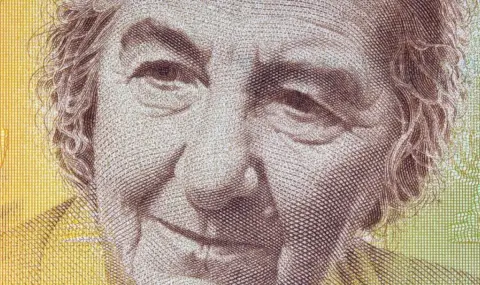Golda Meir died on December 8, 1978. in Jerusalem of cancer. She is the first female Prime Minister of Israel and the third female Prime Minister in the world.
Golda Meir was born Golda Mabovitz in Kiev, part of the Russian Empire (now Ukraine), to Blum Naidtich and Moshe Mabovitz. Golda and her family live in the so-called "Sedentary Line" in the western part of the Russian Empire, created with the anti-Semitic laws of the late 19th century with the aim of concentrating the country's Jewish population there.
In 1903 the father left for the USA, and three years later the whole family emigrated to him. They settled in Milwaukee, where the father worked as a carpenter and the mother ran a grocery store.
In 1915 Golda graduated from high school. At that time he was actively involved in the Zionist Youth Movement. She then graduated from Milwaukee State Normal School (now the University of Wisconsin-Milwaukee), after which she worked as a teacher. In 1917, she married Maurice Myerson and changed her name to Golda Myerson.
Four years later, Golda Myerson, her husband, and her sister Shayna go to Palestine to help establish a Jewish state.
Golda Myerson was among the twenty-four people who on May 14, 1948 sign the Declaration on the Establishment of the State of Israel. The very next day, the country was attacked by the combined forces of Egypt, Syria, Lebanon, Transjordan and Iraq. Then Golda Myerson was issued the first Israeli passport, with which she traveled to the United States to raise funds for the newly formed state. After her return, she was appointed the first Israeli ambassador to the Soviet Union, where she was greeted triumphantly by the Jewish community in Moscow.
A little later, in 1949, Golda Myerson returned to Israel, being elected to the Knesset by the Mapai party and remaining an MP until 1974, serving as Israel's Minister of Labor. In 1956 she became foreign minister in David Ben-Gurion's cabinet. Even her predecessor, Moshe Sharett, ordered all ministry employees to adopt Jewish surnames. Taking the ministerial post, at Ben-Gurion's insistence, Golda Myerson changed her name to Golda Meir (Meir means "giver of light" in Hebrew). In the early 1960s, Meir contracted lymphoma, but hid his illness. In 1965 withdraws from the government and limits his political activity.
After the sudden death of Levi Eshkol (Skolnik) on February 26, 1969. Mapai chose Golda Meir as his successor as party leader and prime minister. This comes shortly after Israel won a decisive victory over the Arabs and captured significant territory in the Six Day War.
During the reign of Golda Meir, the Yom Kippur War took place in 1973. Despite conflicting intelligence reports of an impending attack on Israel and suggestions by Gen. David Elazar for a pre-emptive strike against Syria, Golda Meir decided to wait and thus gained more international support for Israel in the ensuing war.
After the end of the war, Golda Meir's government was destabilized by contradictions in the ruling coalition and by accusations of poor preparation and mistakes in the conduct of the war.
On April 11, 1974, Golda Meir resigned and on June 3, the post was taken by Yitzhak Rabin.
